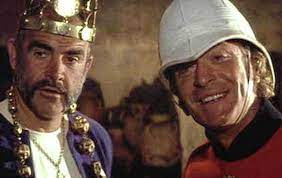Off-List: The Man Who Would Be King
The third
off-List movie for 1975 is “The Man Who Would Be King”. This is one of those
movies that look pretty amazing on paper. A Rudyard Kipling story, directed by
John Huston and starring Sean Connery, Michael Caine and Christopher Plummer.
Yet I never heard of this movie until I started screening 1975 for potential
off-List movies. This could either be a giant flop or a hidden gem.
The answer,
at least in my poor opinion, is somewhere in between. This is a big and
impressive production. There is format here, quality in the production and an
adventure like few others. But there is also something very old-fashioned and outdated
about the story itself and the sentiments behind. “Gunga Din”, another Kipling
story, was outdated in 1939 and “The Man Who Would Be King”, more than 30 years
later follow almost the same colonialist track. There are some excuses, but is
it enough?
Rudyard
Kipling himself (Christopher Plummer) is found by a haggard and slightly
unhinged Peachy Carnehan (Michael Caine) who relates to him a strange tale,
starting with a chance encounter with Kipling years earlier in Victorian era
India. Peachy and Daniel Dravot (Sean Connery) are two British adventurers. As
sergeants in the British colonial forces they have been everywhere and seen everything
in India and they are now effectually conmen roaming the land, exploiting what
they are able to exploit. They latest scheme is to venture into Kafiristan in
present day Afghanistan loaded with guns to set themselves up as kings among
the barbarians.
This starts
out well enough. The locals appear to never having seen firearms before so when
they take down a raiding party they are impressed with them. Peachy and Daniel are
tasked with training an army and conquering the neighbors. When they win, they
prevent the traditional bloodbath and want the conquered to join ranks and instead
the tribe leader is cut down, making Peachy and Daniel de facto leaders. In one
of these early battles Daniel is struck by an arrow. It pierces his bandolier
instead of his chest, but to the locals it looks like he is ignoring a killing
shot and they see him as a god, the long-awaited son of Sikander, Alexander the
Great of antiquity. Being king and god, the two adventurers have gained all
they hope for, only to find out what happens when people realize they have been
duped.
Connery and
Caine are more British than British. Their colonial arrogance is immense and so
is their enterprising cheek. This is both amusing and fascinating, but also
jarring. No doubt they were excellent picks for the roles. As representatives of
western supremacy, they are both shamelessly arrogant and foolishly ignorant. I
would not be surprised if this sort of people actually went around doing these
things in the nineteenth century and I would be even less surprised to learn of
it happening in this day and age. The potential problem here is that we are
supposed to like and root for them and in the process see the locals as
backward fools. And they are likeable and funny and bold and is this right? I
cannot help thinking that as entertaining and impressive this movie is, its
colonialist premise simply does not work anymore and I wonder if it did in 1975.
Sure, their arrogance lead to their fall and there may be a message there and I
suppose that carries a meaning too, but is that the point or just an excuse?
Maybe I am
thinking to much meaning into this. Maybe this should simply be seen as an
adventure, as a boys fantasy, of wealth and fame and danger in the exotic wilds
of the world. And Peachy and Daniel were not the last to underestimate the
Afghans and flee out of the country.
It is worth
watching the movie, the production value alone makes it worthwhile, but I also
understand why it has practically disappeared.

No comments:
Post a Comment